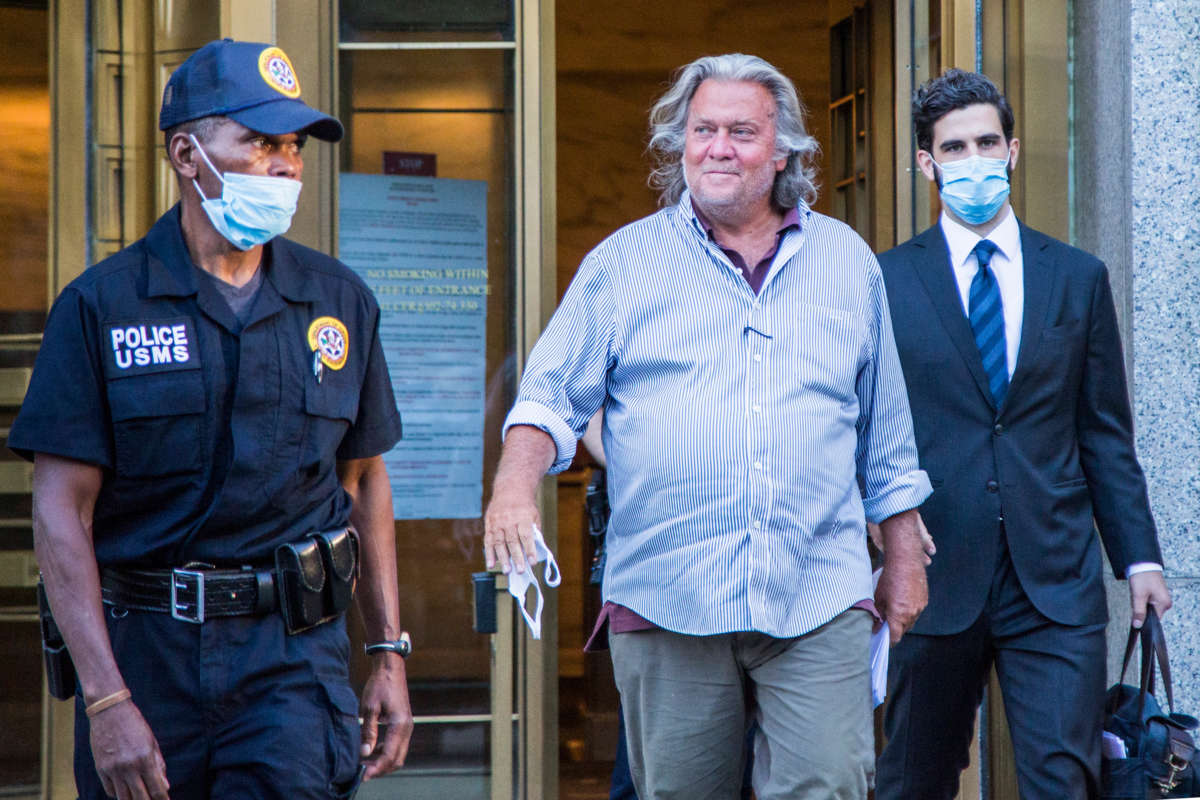Honest, paywall-free news is rare. Please support our boldly independent journalism with a donation of any size.
In one of the final acts of his destructive and corrupt presidency, Donald Trump early Wednesday pardoned his former chief strategist Steve Bannon, a pair of scandal-plagued former Republican lawmakers, disgraced GOP fundraiser and megadonor Elliott Broidy, and other white-collar criminals with political connections.
“Even Nixon didn’t pardon his cronies on the way out,” Noah Bookbinder, executive director of Citizens for Responsibility and Ethics in Washington, said in a statement. “Amazingly, in his final 24 hours in office, Donald Trump found one more way to fail to live up to the ethical standard of Richard Nixon.”
The outgoing president’s latest list of pardons and commutations also included a number of nonviolent drug offenders, but Trump has largely used his clemency power to assist his political allies — when he has used it at all. According to the Pew Research Center, Trump has wielded his pardon authority less than any other president in modern U.S. history.
“They all had something Trump wanted or benefited him in some kind of way,” Nichole Forde, a 40-year-old woman serving a 27-year sentence for nonviolent drug crimes, told the Washington Post in an email from federal prison in Pekin, Illinois. “I am not part of the Trump elite.”
In a statement accompanying the list of people receiving clemency from Trump on his way out the door, the White House characterized Bannon, the former executive chairman of far-right outlet Breitbart News, as “an important leader in the conservative movement” who is “known for his political acumen.”
Last August, Bannon was arrested and charged with defrauding hundreds of thousands of people, many of them Trump supporters, who donated to an online anti-immigrant crowdfunding campaign called “We Build the Wall.”
Trump pardoning a guy charged with stealing from Trump supporters is the ultimate grift
— Citizens for Ethics (@CREWcrew) January 20, 2021
More than a dozen other individuals included in Trump’s last-minute flurry of pardons and commutations were convicted of some kind of fraud. As the Post reported, one commutation “went to Sholam Weiss, 66, who was serving an 835-year prison sentence stemming from his 2000 conviction in Florida for racketeering, wire fraud, and money fraud related to his role in the collapse of the National Heritage Life Insurance Company.”
“Weiss’ sentence was believed to be the longest ever given to a defendant convicted of white-collar crime,” the Post noted.
Other names on the list include former Republican Rep. Duke Cunningham of California — who served eight years in prison for tax evasion, conspiracy to commit bribery, and other charges — and Salomon Melgen, who in 2017 was convicted of a total of 67 crimes for his role in a scheme to steal $73 million from Medicare by exploiting elderly patients.
Trump granted a conditional pardon to Cunningham and commuted Melgen’s 17-year sentence.
“I guess it helps to have friends in high places,” remarked Bloomberg reporter Steven Dennis.
A terrifying moment. We appeal for your support.
In the last weeks, we have witnessed an authoritarian assault on communities in Minnesota and across the nation.
The need for truthful, grassroots reporting is urgent at this cataclysmic historical moment. Yet, Trump-aligned billionaires and other allies have taken over many legacy media outlets — the culmination of a decades-long campaign to place control of the narrative into the hands of the political right.
We refuse to let Trump’s blatant propaganda machine go unchecked. Untethered to corporate ownership or advertisers, Truthout remains fearless in our reporting and our determination to use journalism as a tool for justice.
But we need your help just to fund our basic expenses. Over 80 percent of Truthout’s funding comes from small individual donations from our community of readers, and over a third of our total budget is supported by recurring monthly donors.
Truthout has launched a fundraiser to add 379 new monthly donors in the next 6 days. Whether you can make a small monthly donation or a larger one-time gift, Truthout only works with your support.
